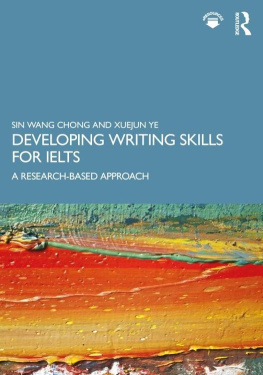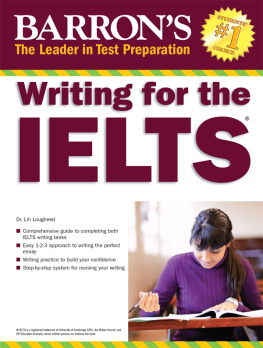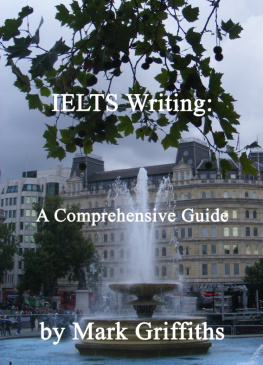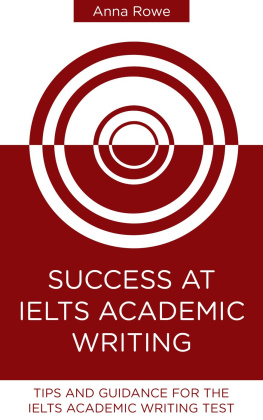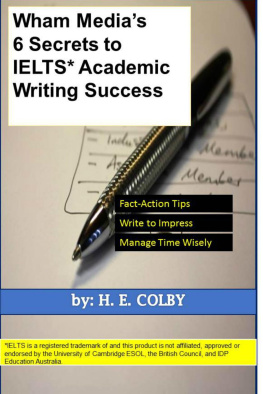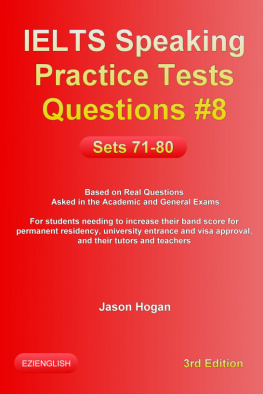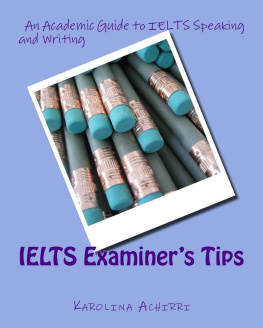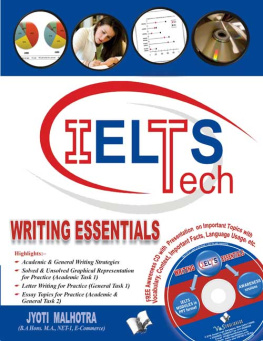DEVELOPING WRITING SKILLS FOR IELTS
An essential companion for IELTS writing instructors and students, Developing Writing Skills for IELTS provides IELTS test-takers with the necessary skills to succeed in the two academic writing tasks in IELTS.
Adopting an original exemplar-based writing instructional approach, this text offers an in-depth and reader-friendly analysis of the assessment standards of the two academic writing tasks in IELTS. Authentic exemplars written by EFL university students are included to illustrate high (Bands 89), average (Bands 67), and low (Bands 45) performances in IELTS writing.
Key Features:
- Diagrammatical representation of assessment standards of the two academic writing tasks by experienced IELTS writing examiners and instructors.
- 100 writing questions modelled after the IELTS format, designed by the authors, and categorised according to question types and topics that emerge from an analysis of over 400 IELTS writing questions.
- Over 100 writing exemplars by EFL university students, accompanied by guided activities and suggested answers.
Designed as a classroom text, a resource for workshops and consultations, or a self-study material, Developing Writing Skills for IELTS: A Research-based Approach will support IELTS writing instructors and test-takers with a variety of writing proficiencies.
Sin Wang Chong is Lecturer (Assistant Professor) in TESOL in the School of Social Sciences, Education and Social Work at Queens University Belfast in the UK. His research interests include language and educational assessment, research synthesis, and computer-assisted language learning. He is Associate Editor of two journals, Higher Education Research & Development (T&F) and Innovation in Language Learning and Teaching (T&F).
Xuejun Ye is a doctoral candidate in Applied Language Sciences at the Hong Kong Polytechnic University and a former research assistant at the Education University of Hong Kong.
DEVELOPING WRITING SKILLS FOR IELTS
A Research-Based Approach
Sin Wang Chong and Xuejun Ye

First published 2021
by Routledge
52 Vanderbilt Avenue, New York, NY 10017
and by Routledge
2 Park Square, Milton Park, Abingdon, Oxon, OX14 4RN
Routledge is an imprint of the Taylor & Francis Group, an informa business
2021 Taylor & Francis
The right of Sin Wang Chong and Xuejun Ye to be identified as authors of this work has been asserted by them in accordance with sections 77 and 78 of the Copyright, Designs and Patents Act 1988.
All rights reserved. No part of this book may be reprinted or reproduced or utilised in any form or by any electronic, mechanical, or other means, now known or hereafter invented, including photocopying and recording, or in any information storage or retrieval system, without permission in writing from the publishers.
Trademark notice: Product or corporate names may be trademarks or registered trademarks, and are used only for identification and explanation without intent to infringe.
Library of Congress Cataloging-in-Publication Data
A catalog record for this title has been requested
ISBN: 978-0-367-25839-9 (hbk)
ISBN: 978-0-367-25837-5 (pbk)
ISBN: 978-0-429-29016-9 (ebk)
Typeset in Interstate
by KnowledgeWorks Global Ltd.
Visit the eResources: www.routledge.com/9780367258375
CONTENTS
Table of Contents
Page List
Landmarks
The answer chapters in . Then click on the tab that says Support Material and select the files. They will begin downloading to your computer.
The authors would like to acknowledge the support of the Education University of Hong Kong who funded the project Developing an Exemplar Anthology and Online Exemplar Platform for IELTS Writing through the Teaching Development Grant (T0203).
We would like to express our gratitude to the scholars, researchers, teachers, and students whose contributions have made this textbook a more useful resource to IELTS teachers and test-takers. First, we would like to thank the two external reviewers of this project, Prof Hayo Reinders, TESOL Professor at Anaheim University and Dr Jessica To, Post-doctoral Fellow at the Faculty of Education, the University of Hong Kong, for their valuable comments on this textbook. Our heartfelt appreciation also goes to former colleagues of the first author at the Centre for Language in Education, the Education University of Hong Kong, for sharing their expert knowledge in teaching and assessing IELTS Writing. In particular, we would like to thank Miss Blanche Chu, Mr David Brown, and Mr Stephen Holyoak for participating in lengthy individual interviews which consolidated our understanding of the assessment standards of IELTS Writing. Last but not least, we would like to thank all the undergraduate and postgraduate students at the Education University of Hong Kong who participated in this project and provided their written consent for us to use their writing as textbook materials.
The first author would like to acknowledge that is written based on an article published in Assessment & Evaluation in Higher Education (Taylor & Francis):
Chong, S. W. (2019). The use of exemplars in English writing classrooms: From theory to practice. Assessment & Evaluation in Higher Education, 44(5), 748763.
Finally, we would like to acknowledge that a version of the materials presented in this textbook is stored on the Intranet of the Education University of Hong Kong for free usage by the universitys staff and students. A note was added to this electronic version of the materials indicating that its final version will be published in the form of a textbook by Routledge. This arrangement was an agreement made between the publisher and the authors.
Sin Wang Chong
School of Social Sciences, Education and Social Work
Queens University Belfast, UK
Xuejun Ye
Faculty of Humanities
The Hong Kong Polytechnic University
What is IELTS?
IELTS, the International English Language Testing System, managed by the University of Cambridge Local Examinations Syndicate (UCLES), the British Council, and the Australian International Development Programme (IDP), is designed to measure the language proficiency of candidates who need entry to study or work in the United Kingdom and other English-speaking countries.
What are the Two IELTS Test Types?
The IELTS test consists of two forms: the Academic test (or module) and the General Training test (or module). Test-takers choose the module according to the purpose of taking the test. Generally speaking, people take the Academic module in order to satisfy the language entrance requirement of academic programmes offered by post-secondary institutions and universities which use English as the medium of instruction or fulfil the professional requirements in their workplace. For people who expect to join professional associations in nursing, medicine, law, or engineering, they may also be required to take this academic version of IELTS to become a member of a professional body in an English-speaking country. However, for people who aspire to enrol in vocational courses, secondary schools or, for immigration purposes, these individuals are required to take the General Training module. The government authorities of English-speaking countries, including Australia, Canada, New Zealand, the United States, and the United Kingdom, often demand and accept an IELTS score of the General Training certificate to prove the language competence of the applicants.

